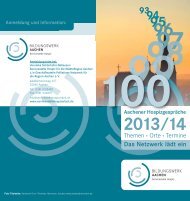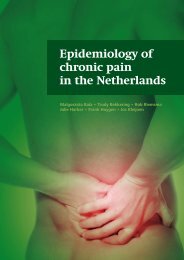First EFIC® Symposium Societal Impact of Pain - SIP
First EFIC® Symposium Societal Impact of Pain - SIP
First EFIC® Symposium Societal Impact of Pain - SIP
You also want an ePaper? Increase the reach of your titles
YUMPU automatically turns print PDFs into web optimized ePapers that Google loves.
Ken Paterson<br />
Pr<strong>of</strong>. Ken Paterson<br />
Chair – Scottish Medicines Consortium<br />
Are We Adequately Equipped to Assess<br />
<strong>Pain</strong> Therapies?<br />
Assessment <strong>of</strong> the comparative effectiveness<br />
and cost-effectiveness <strong>of</strong> healthcare<br />
interventions is increasingly being undertaken<br />
as the funds available to provide healthcare are<br />
increasingly stretched. New therapies in the<br />
field <strong>of</strong> pain are subject to such assessment<br />
and frequently fail to demonstrate that the<br />
clinical benefits they bring justify the required<br />
expenditure. This may reflect limitations in<br />
the therapies, but could also highlight<br />
issues with the assessment parameters and<br />
methodologies.<br />
Given that the symptom <strong>of</strong> pain is widely feared<br />
and has many negative impacts on quality <strong>of</strong> life<br />
it is surprising that pain therapies have failed<br />
to show cost-effectiveness. It is possible that<br />
limiting the perspective <strong>of</strong> health economic<br />
assessment to the view <strong>of</strong> the healthcare<br />
payer misses out on substantial benefits <strong>of</strong><br />
therapy, while the absence <strong>of</strong> prolongation <strong>of</strong><br />
survival due to the use <strong>of</strong> purely symptomatic<br />
therapy may also limit the potential to show<br />
benefit. Some quality <strong>of</strong> life assessment tools<br />
may inadequately capture the benefit <strong>of</strong> pain<br />
relief, especially if this benefit is largely<br />
psychological and does not translate into<br />
improvements in day-to-day physical activity.<br />
Is pain a special case in terms <strong>of</strong> health<br />
technology assessment …. and if so why, and<br />
what can we do differently? Do we need new<br />
tools, or do those developing and assessing<br />
pain therapies need to make better use <strong>of</strong> tools<br />
already at our disposal?<br />
75






